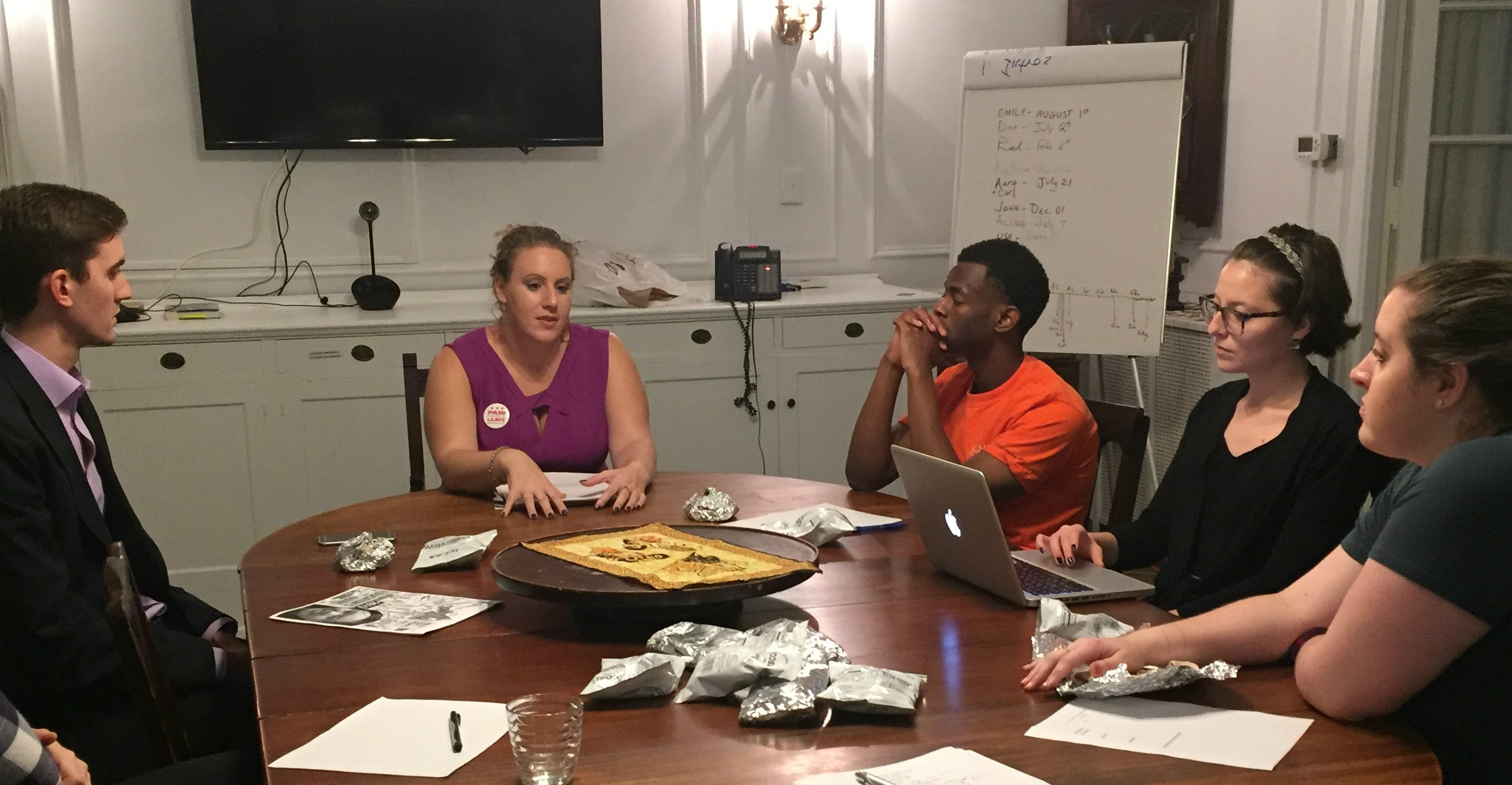
Students with AFSC's Human Rights Learning Project met several times with Joanna Blotner, manager of the D.C. Paid Family Leave Campaign. Washington, D.C. / AFSC
By Alex Frazier
Recent high school graduate Alex Frazier was a participant in AFSC's Human Rights Learning Project in Washington, D.C. She writes about her experience taking part in successful advocacy efforts for a comprehensive parental and sick leave policy in the District.
Two weeks ago, Washington, D.C. Mayor Muriel Bowser allowed a new law to take effect to create one of the most generous parental and sick leave policies in the country—benefiting over half a million workers in our nation's capital.
The D.C. City Council had passed the bill last December—a major step in establishing one of the only citywide paid leave programs in the country. Known as the Universal Paid Leave Amendment Act of 2016, the bill provides eight weeks of paid leave for workers to take care of new babies, six weeks for workers to take care of sick family members, and two weeks for personal medical emergencies. It would mandate the replacement of 90 percent of the salaries of workers who make up to 1.5 times the local minimum wage, and 50 percent of wages beyond that amount. This system was specifically intended to benefit low-income workers, who are least likely to get paid leave from their current employers but are most in need of a steady paycheck.
The vote represented a victory for AFSC and its partners in the D.C. Paid Leave Coalition, who have been advocating for the bill since before its introduction last October.
During the spring of 2015, students from AFSC's Human Rights Learning project at Dunbar High School in Washington, D.C. got involved in the bill's creation. The basic approach of the Human Rights Learning project involves using the Universal Declaration of Human Rights as a framework to empower D.C. youths and community members to identify, examine, and address social justice issues in their communities. The students met with Joanna Blotner, manager of the D.C. Paid Family Leave Campaign, several times to learn about the bill. They applied their new understanding of human rights and their own personal experiences to write testimonies in favor of the bill, which Joanna collected for use in the campaign. They also organized a forum with representatives of Councilmembers David Grosso and Kenyan McDuffie to expand on the reasons that the bill would benefit their communities. Both councilmembers voted in favor of the final version of the bill.
While most councilmembers were in favor of the bill, a few had serious objections to its provisions. Some, like Councilmember Jack Evans, worried about the program's more than $238 million a year expense (the money would come from a .62 percent increase in payroll taxes and be put into a communal pool, and the government would contribute to additional costs). Others, including Councilmember LaRuby May, disapproved of the fact that the bill would cover the 64 percent of D.C. workers who live in Maryland and Virginia, moving much-needed D.C. funds away from the District. In addition, outside groups expressed the concern that the bill would add more regulations to small businesses in the District that would make it harder for them to survive and thrive.

These doubts about the bill caused Councilmember Evans to put forth an amendment that would provide much less government funding for the paid leave program, making it harder for small businesses to implement it. The members of the D.C. Paid Leave Coalition, including AFSC, worked hard to gain enough support from the other councilmembers to block the amendment. Their many volunteers called, emailed, and tweeted at the councilmembers, hoping that the massive show of popular support would be enough to influence them to vote for the current version of the bill.
On behalf of AFSC, I personally went to every single office in the council building on Pennsylvania Avenue to lobby for the bill. I joined one of the many small lobbying groups that were making the rounds, reinforcing the calls and emails with in-person appeals to councilmembers and their staff. My group was able to speak briefly to Councilmember Evans, who represents my neighborhood in D.C. He told us that while he supported paid leave, he thought that we hadn't thought through the implications of the bill. A meeting with staff of Councilmember Anita Bonds was also frustrating, as they refused to give us a straight answer on whether she would support the bill.
Our demonstration of popular support for the bill continued even on the day of the vote, when we filled the council room with people wearing red, the campaign's signature color. It was a diverse crowd; I saw pediatricians, business owners, and mothers with small children, all there to demonstrate how much they cared about getting the bill passed.
The work paid off when the council, after some debate, passed the paid leave bill with a veto-proof majority of 9-4.
Although Mayor Bowser has allowed the bill to become law without her signature, her support will be critical to ensure its full implementation. AFSC and its coalition partners will continue working to influence both the council and the mayor to work for the new law's success and give D.C. workers the full rights they deserve.